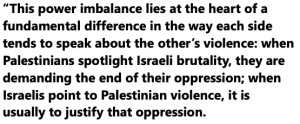The myth of the ‘cycle of violence’

JVL Introduction
Amjad Iraqi tackles head on the myth of the cycle of violence which holds two sides equally to blame for the ongoing killings.
There is, he points out, no “cycle” here: violence is a constant, daily experience for Palestinians, it is intermittent and occasional for Jewish-Israelis. And it does not hurt both sides equally.
When Palestinians spotlight Israeli brutality, they are demanding the end of their oppression; when Israelis point to Palestinian violence, it is usually to justify that oppression.
This article was originally published by the Landline, +972's newsletter on Tue 31 Jan 2023. Read the original here.
The myth of the ‘cycle of violence’
This article originally appeared in “The Landline,” +972’s weekly newsletter. Subscribe here.
Why launch a devastating incursion, targeting militants yet harming countless civilians, when that method has been proven to exacerbate rather than contain violence? What’s the point of threatening attackers with home demolitions when thousands of innocent people, including the attackers’ own families and neighbors, are equally threatened with the same fate? Why put guns into the hands of more civilians when there is already an armed resident, soldier, police officer, or security guard on every street?
Most Israelis didn’t bother asking these questions when the army raided the Jenin refugee camp on Thursday morning, killing 10 people while causing wanton destruction. They certainly didn’t want to consider these questions the next day, when a young Palestinian shot dead seven Israelis in the East Jerusalem settlement of Neve Yaakov, or when a 13-year-old Palestinian boy later shot and wounded two Israeli settlers in the neighborhood of Silwan. And they barely raised those questions when, like clockwork, Prime Minister Benjamin Netanyahu announced the government’s usual measures to “deter” further attacks, from punishing the assailants’ family members to approving more gun licenses to building more settlement units.
 For many Israelis, such reflections on their leaders’ habitual responses are best avoided in order to preserve a simple, rigid worldview: Palestinians hate us for no reason, they attack us without cause, and so we have no choice but to beat them down. More critical Israelis may instead lament the worn-out aphorism of a “cycle of violence,” seeking to draw some moral parity of responsibility and harm between the two sides.
For many Israelis, such reflections on their leaders’ habitual responses are best avoided in order to preserve a simple, rigid worldview: Palestinians hate us for no reason, they attack us without cause, and so we have no choice but to beat them down. More critical Israelis may instead lament the worn-out aphorism of a “cycle of violence,” seeking to draw some moral parity of responsibility and harm between the two sides.
But there is no “cycle” here. From the structural to the physical, violence is a constant, daily experience for Palestinians, and far less so for Jewish-Israelis. Few media outlets, for example, spent ink on the fact that about 30 Palestinians have already been killed this past month, and if they did, it was invoked only in light of the killings of Israelis last weekend. Many Israelis would not have heard that, on Saturday night, settlers set fire to and destroyed Palestinian property across the occupied West Bank — a so-called “price tag” that is already inflicted on villages every week. Thanks to the boasting of government officials, though, they may have seen that Israeli forces are currently demolishing multiple homes in Palestinian neighborhoods of Jerusalem — never mind if the owners have any connection to the recent murders.
The myth of violence equally hurting Palestinians and Israelis further obfuscates the fact that one side actually tends to benefit from this “cycle” at the expense of the other. Violence is both a means and a pretext for Israeli land authorities to chip away at Palestinian neighborhoods and expand Jewish settlements, as is happening now in Jerusalem; or for Israeli politicians, including Netanyahu and Itamar Ben Gvir, to show their constituents that they are turning their aggressive rhetoric into action; or for hasbarists to rally international sympathy behind Israel and its military actions; or for the Israeli public to convince itself that an ethno-national regime is warranted and necessary.

These fruits of violence, simply put, are derived from the gross asymmetry of power that lies at the heart of this purported “conflict.” With massive resources and perpetual impunity, one side is able to insulate itself physically and psychologically from the inhumane ways in which it dominates the other. Palestinians are thus forced to live under the weight of being deemed “killable” — nameless, expendable objects on whom violence can be inflicted without batting an eyelid. It is telling that international awareness of Palestinian death and suffering, if any, is often contingent upon some harm being done to the other side; from mainstream media coverage to diplomats’ condolences, Israelis always come first.
This power imbalance lies at the heart of a fundamental difference in the way each side tends to speak about the other’s violence: when Palestinians spotlight Israeli brutality, they are demanding the end of their oppression; when Israelis point to Palestinian violence, it is usually to justify that oppression. It is yet another link in the chain that Palestinians are trying to break: the world’s belief that their lives only matter if their colonizer decides they do.
 Amjad Iraqi is an editor and writer at +972 Magazine. He is also a policy analyst at the think tank Al-Shabaka, and was previously an advocacy coordinator at the legal center Adalah. In addition to +972, his writings have appeared in the London Review of Books, The Nation, The Guardian, and Le Monde Diplomatique, among others. He is a Palestinian citizen of Israel, based in Haifa.
Amjad Iraqi is an editor and writer at +972 Magazine. He is also a policy analyst at the think tank Al-Shabaka, and was previously an advocacy coordinator at the legal center Adalah. In addition to +972, his writings have appeared in the London Review of Books, The Nation, The Guardian, and Le Monde Diplomatique, among others. He is a Palestinian citizen of Israel, based in Haifa.

When one recognises that the Israeli (Jews) are engaged in a process of (Christian Zionist-sponsored) ethnic cleansing, it is quite clear that the Israelis are not going to stop until Palestinians have been deprived sufficiently – whatever that constitutes!
Where there is an occupying power, under international law:-
Collective punishment is prohibited.
The taking of hostages is prohibited.
Reprisals against protected persons or their property are prohibited.
The confiscation of private property by the occupant is prohibited.
Which of these War Crimes has Israel NOT committed?
“the myth of the cycle of violence which holds two sides equally to blame for the ongoing killings”. The IDF would come first in any shooting fish-in-a-barrel competition.
It’s a well trodden path which defends the guilty by this form of reporting, often used by the BBC and others. The Forde Report, while making some clear apportioning of blame to the Labour establishment, summed up the left/right conflict within the party in a similar way, thus debasing the facts which Forde had revealed, but were in any case so obvious to anyone who actually read the Report.
P.S. The 9, later 10 Palestinians killed which began the latest killings, hardly raised a murmur until reported as a postscript to the reports on the Israeli deaths. It was ever thus.
As the Chinese saying goes: “You can’t equate the burglar with the householder.”